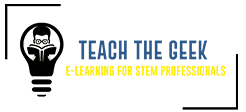In today’s fast-paced world, technical professionals often find themselves in situations where they need to present complex information to non-technical audiences. Communicating technical knowledge effectively can be challenging due to the knowledge gap between the presenter and the audience. However, with the right approach and preparation, this gap can be bridged. Let’s explore three key strategies for learning and development professionals and functional managers to help technical professionals present more effectively to non-technical audiences.
Providing a Repeatable Process
The first step in helping technical professionals deliver effective presentations is to provide them with a repeatable process. Having a process allows presenters to follow a proven method instead of starting from scratch each time. Engineers who work in research & development or product development are used to following a process. Scientitsts who work in a wet lab are used to following standard operating procedures. They’re used to processes, so providing one would be welcome. This process can include elements such as speech structure, defining a clear call to action, and working backward to create a presentation that leads to the call to action. By providing a flexible process, learning and development professionals can cater to different presentation scenarios, allowing technical professionals to adapt and apply the process accordingly.
Practicing with the Process
Once a repeatable process is established, it is crucial to provide opportunities for technical professionals to practice using it. Creating a low-stakes environment where they can experiment with different presentation techniques, such as crafting alternative introductions or compelling endings, can significantly enhance their skills. Feedback from peers and mentors during these practice sessions can help them refine their delivery and build confidence. Additionally, virtual or in-person practice sessions offer technical professionals the chance to fine-tune their presentation skills and receive constructive feedback before facing high-stakes situations. L&D and functional managers can work together to create these practice sessions.
Advocating for High-Stakes Opportunities
Once technical professionals have gained proficiency in using the process and have practiced in low-stakes environments, learning and development professionals or functional managers can play a crucial role in advocating for high-stakes presentation opportunities. These opportunities could include presenting to customers, vendors, or speaking at conferences. By championing the technical professionals and promoting their use of the learned process, these advocates ensure that the technical professionals are well-prepared to deliver impactful presentations in critical situations. Building a strong support network and fostering a culture that values effective technical communication can create a pathway for growth and success for these professionals
Bridging the gap between technical professionals and non-technical audiences is essential for effective communication. Learning and development professionals, as well as functional managers, can play a vital role in this process. By providing a repeatable process, offering opportunities for practice, and advocating for high-stakes presentation opportunities, technical professionals can develop their presentation skills and confidently convey their technical knowledge to non-technical audiences. With these strategies in place, the gap between technical and non-technical individuals can be bridged, resulting in more effective communication, collaboration, and success for organizations and their technical professionals.

